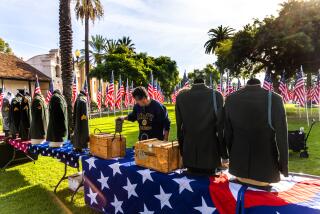Army Staff Sgt. Conrad Mora, 24, San Diego; among 4 killed by roadside bomb in Afghanistan
- Share via
Reporting from Chula Vista, Calif. — Among the photographs displayed at the funeral for Army Staff Sgt. Conrad Mora was one showing him receiving a commendation from Adm. Michael G. Mullen, chairman of the Joint Chiefs of Staff.
Mora was honored last year for dashing into a minefield to rescue Afghan civilians injured when a roadside bomb exploded.
To his friends, family and fellow soldiers, Mora’s bravery and leadership that day were not a surprise.
“There are three kinds of soldiers: those who make things happen, those who watch things happen and those who wonder what happened,” said 1st Sgt. Cesar Zertuche. “Conrad was a soldier who made things happen.”
Mora enlisted in 2004, just days after he graduated from Morse High School in southeast San Diego. He was promoted rapidly and considered an expert in handling complex rocket-launching systems.
In his second deployment to Afghanistan, Mora was assigned to one of the most dangerous missions of the nine-year war: hunting daily for roadside bombs and trying to make sure routes used by the military and Afghan civilians were safe.
“He wasn’t scared,” said his wife, Ann. “Or, if he was, he never showed it. He would always say, ‘Inshallah,’ (God willing), if it’s my time to die, it’s my time.’ ”
On July 24, Mora, 24, and three other soldiers were killed when their vehicle struck a hidden explosive device in the city of Qalat in Zabul province, just east of the Taliban stronghold of Kandahar.
All were from the 5th Battalion, 3rd Field Artillery Regiment, 17th Fires Brigade at the Army-Air Force Joint Base Lewis-McChord, Wash.
The four men were in a mine-resistant, ambush-protected vehicle, one of the heaviest and sturdiest vehicles used by U.S. troops. Attached to the front was a rolling device meant to absorb the impact of a blast.
That the explosion was powerful enough to kill four soldiers is the latest evidence of the insurgents’ evolving ability to use the makeshift weapons known as improvised explosive devices, or roadside bombs.
Of U.S. service personnel killed this year in Afghanistan, 58% were killed by the devices. The explosions are also taking a toll on Afghan and other coalition forces, and on Afghan civilians.
The day before he died, Mora called his wife. He was excited that his deployment would be finished within weeks and looked forward to being home for their son Christopher’s second birthday.
Mora had been deployed for the boy’s first birthday. “He wanted the party to be huge,” Ann Mora said of her husband. “Our son was his whole life.”
The couple met when Mora was stationed at Ft. Sill, Okla., and Ann was attending Cameron University in the neighboring town of Lawton. At first, she was reluctant to date the young soldier, but he was persistent. They were married on Jan. 13, 2007.
Born in the Philippines, Mora was 9 when his family moved to the United States, settling in southern San Diego County, which has a large Filipino community.
Mora played baseball in high school and knew he wanted to join the military, his wife said. She said the service represented a way for him to “do his part” for his adopted country after the Sept. 11 attacks and also to provide financial support for his mother.
At his funeral Aug. 1, Mora’s sister, Carmela Anne Lleva, recalled growing up in a one-bedroom apartment where she and her brother pretended to be Ninja Turtles, or pro wrestlers.
“Thank you for being my childhood friend,” she said tearfully. “No one in this world can replace you. I’ll see you in paradise.”
Dozens of those in attendance wore T-shirts with Mora’s picture, his nickname (Jig-Jig), and the number 21.
He was convinced that 21 was his lucky number. When his favorite football player, running back Ladainian Tomlinson, wore the number 21, Mora became increasingly attached to the idea.
And when Christopher was born on the 21st of November, Mora was sure that the number would bring his son good fortune.
Although the couple had yet to make the decision, Mora was considering the Army as a career. “He was a soldier that you’d want on your team,” Zertuche said.
In addition to his wife and son, Mora’s survivors include his mother, Carmelita Fernando; his father, Alejandrino Mora; and three brothers, Carlo, Christian and Czar.
When two soldiers in dress uniforms knocked on the door at the Moras’ apartment at 6 a.m., Ann Mora, like many a military spouse, knew instinctively it was the worst possible news.
“I saw them through the peephole,” she said. “I didn’t want to open the door. I thought maybe if I didn’t open the door, it wouldn’t be true.”
The couple had been talking about buying a home in DuPont, the Washington suburb where they had lived before Mora’s unit deployed in October.
Now Ann Mora is considering moving to the San Diego area so Christopher can grow up near his father’s family and friends.
“I want him to know that his daddy was a hero,” she said.
tony.perry@latimes.com
More to Read
Sign up for Essential California
The most important California stories and recommendations in your inbox every morning.
You may occasionally receive promotional content from the Los Angeles Times.










